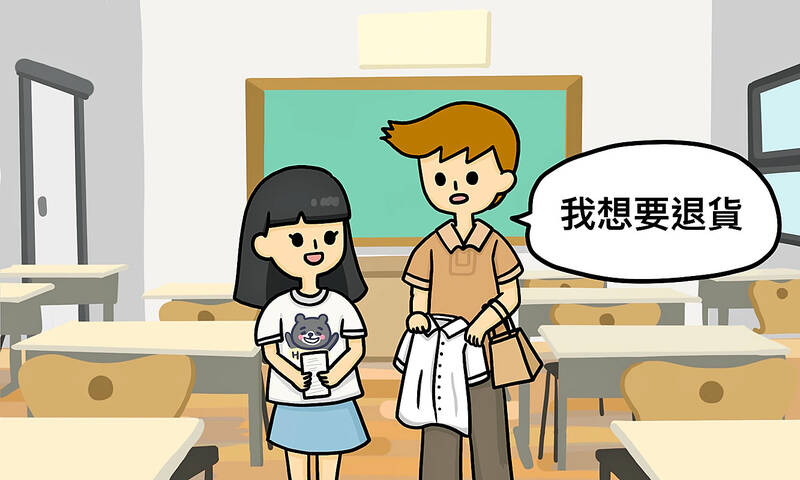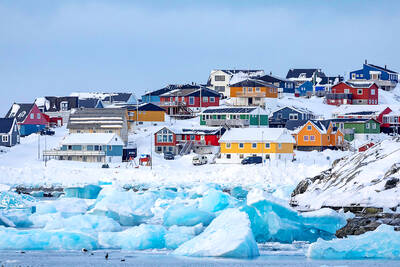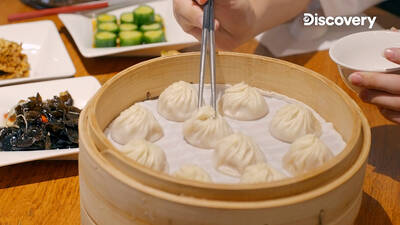對話 Dialogue
馬克:小實,請問在臺灣,衣服買錯了可以退貨嗎?
Make: Xiǎoshí, qǐngwèn zài Táiwān, yīfú mǎi cuò le kěyǐ tuìhuò ma?

小實:這個嘛……不是內衣、內褲吧?
Xiaoshi: Zhèige ma. . . búshì nèiyī, nèikù ba?
馬克:不是,是襯衫。我在網路上買的襯衫太小件了。
Make: Búshì, shì chènshān. Wǒ zài wǎnglù shàng mǎi de chènshān tài xiǎo jiàn le.
小實:喔!只要衣服沒有破,吊牌也還在,應該都可以退貨。
Xiaoshi: Ō! Zhǐyào yīfú méiyǒu pò, diàopái yě hái zài, yīnggāi dōu kěyǐ tuìhuò.
馬克:吊牌?啊,你是說有尺寸、材質和清洗方式的那張卡片嗎?
Make: Diàopái? A, nǐ shì shuō yǒu chǐcùn, cáizhí hàn qīngxǐ fāngshì de nèi zhāng kǎpiàn ma?
小實:對對對,就是那個!對了,你為什麼不換大一點的就好了?
Xiaoshi: Duì duì duì, jiùshì nàge! Duìle, nǐ wèishénme bú huàn dà yìdiǎn de jiù hǎo le?
馬克:這件已經是最大號的了,所以我想退貨。
Make: Zhè jiàn yǐjīng shì zuì dà hào de le, suǒyǐ wǒ xiǎng tuìhuò.
小實:你在哪個網站買的?給我收據,我來幫你退吧!
Xiaoshi: Nǐ zài nǎge wǎngzhàn mǎi de? Gěi wǒ shōujù, wǒ lái bāng nǐ tuì ba!
翻譯 Translation
Mark: Xiaoshi, in Taiwan, can I return clothes if I made a mistake with the order?
Xiaoshi: Well. . . it’s not underwear or panties, is it?
Mark: No, it’s a shirt. The shirt I bought online is too small.
Xiaoshi: Oh. As long as the clothes are not torn and the tags are still there, you should be able to return them.
Mark: Tags? Ah, you mean the card with the size, materials and cleaning instructions?
Xiaoshi: That’s right. By the way, why don’t you just change it for a larger size?
Mark: This one is already the largest size, so I want to return it and get a refund.
Xiaoshi: OK, which Web site did you buy it from? Give me the receipt and I’ll get a refund for you!
單字片語 Vocabulary
1. 內衣 (nèiyī) underwear, lingerie
2. 內褲 (nèikù) underwear, panties
3. 襯衫 (chènshān) shirt
4. 只要 (zhǐyào) if only, as long as
5. 破 (pò) broken
6. 尺寸 (chǐcùn) size
7. 材質 (cáizhí) material
8. 清洗方式 (qīngxǐ fāngshì) cleaning instructions
9. 收據 (shōujù) receipt
教材音檔 Audio Files
教材影片 Video Files:
https://www.instagram.com/celc.nou_tw/guide/_/17999106352646292/
實踐大學華語中心提供
By Shih Chien University Chinese Language Center: https://chineseusc.com/

US President Donald Trump has renewed his ambition to take control of Greenland for national security reasons and questioned whether Denmark has any legal right to the Arctic island. The debate has revived scrutiny of how Greenland became part of Denmark, its current self-rule and path to independence, and Washington’s military footprint. HOW DID DENMARK GET GREENLAND? Greenland was inhabited by Inuit peoples from Asia and North America intermittently from around 2,500 BC. Around 985 AD, Vikings led by Erik the Red settled in southern Greenland, farming and building churches. Around the same time, ancestors of today’s Inuit arrived, living as hunters

Owls have long fascinated people with their distinctive appearance and mysterious habits. These nocturnal birds possess large, round eyes and a flat facial disc. Their feathers come in shades of brown, gray, or white, helping them blend easily into the darkness. The most remarkable trait of owls is that they can turn their heads without damaging blood vessels. Contrary to popular belief, they can only rotate their heads up to 270 degrees, not 360 degrees. Owls have 14 cervical vertebrae, which is twice as many as humans. This special physical structure compensates for their inability to move their eyes within their

AI-generated summaries are shaking up the media world. Tools like Google’s AI Overviews now provide users with direct answers above the search results, resulting in fewer people clicking on news links. For publishers who rely on that traffic to generate advertising revenue, this shift is hitting hard. The fallout is measurable. Many sites have seen a sharp drop in traffic since AI summary features rolled out. An analysis revealed that a news outlet that had once ranked first on Google lost up to 79% of its traffic when its link appeared beneath an AI-generated summary. Statistics also show that

A: Bloomberg just released its annual travel guide, titled “25 Best Places to Travel in 2026.” What were the best Asian destinations? B: There were actually six Asian hotspots: Taiwan’s Taipei, Malaysia’s Penang, Kazakhstan’s Almaty, Indonesia’s Rote Island, India’s Tiger Reserves, and Oman. A: With its mix of traditional food and modern cuisine, Taipei has become a rising food capital in Asia. B: As Bloomberg reported, “Taiwan is a place that bubbles up in culinary conversation because of its famed beverage, bubble tea, and its early adoption of modern night markets.” A: And Din Tai Fung has now